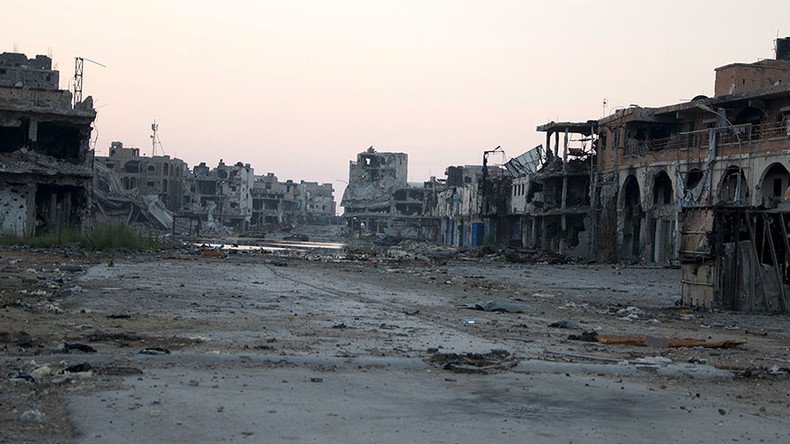Kerry warns Libya may become ‘failed state’

Libya risks becoming “a failed state” if the UN-brokered unity government flops, Secretary John Kerry has said. While Libya remains broke and insecure five years after NATO’s 2011 military intervention, Kerry believes “a wealthy nation” can rebuilt itself.
The remarks by the head of the Department of State came during his second visit to Capitol Hill seeking to defend a proposed $50 billion foreign aid budget for 2017, the last of the Obama administration.
While he focused mostly on recent developments in Syria, Kerry’s attention was briefly shifted to Libya. When asked if “Libya is a failed state,” he replied: “It’s close.”
“We have been working really hard for the last months, particularly, to bring together the government in Tripoli,” Kerry told the House Appropriations Committee on Foreign Operations. “We have a Prime Minister designate, we have a government now; we have a couple of outliers that are resisting that effort. If they cannot get themselves together, yes it will be a failed state.”
Since the 2011 ouster and killing of its long-term leader, Colonel Muammar Gaddafi, Libya has essentially been “torn apart” by two factions based in opposite sides of the country that simultaneously claim power.
After an election in 2014, an Islamist-dominated body settled in Tripoli in the west, while an internationally recognized legislature is based in the eastern city of Tobruk.
There they go again: US mulls anti-#ISIS operations in ‘liberated’ Libya https://t.co/1DrA6r6EpCpic.twitter.com/E0NwstWlVe
— RT America (@RT_America) January 27, 2016
Nearly five years since the West’s military intervention, the broke and insecure Northern African state remains in a power vacuum as Islamic State (IS, formerly ISIL/ISIS) tries to solidify its foothold.
Hopes are currently high that Libya’s UN-backed revised national unity government will be approved by the country’s eastern parliament in Tobruk, setting a course to stability.
On Wednesday, the majority of the parliament’s 196 members voted in support of the unity government, with many abstaining citing threats they had received.
‘US airstrikes in Libya can worsen the situation’ (Op-Edge) https://t.co/ejYTGn4u7Gpic.twitter.com/5OBniPzEoH
— RT (@RT_com) February 20, 2016
Outlining America’s diplomatic goals, the Secretary said that Libya, along with Yemen – which Kerry said is already “a failed state” – is one of the primary concerns for Washington as it is “striving to end conflicts that fuel extremism.”
In a back and forth with Lindsey Graham (R-South Carolina), the subcommittee’s chairman, Kerry agreed that it “should not cost us a whole life” to bring Libya back together.
“The virtue of that, Mr. Chairman, is that Libya is a wealthy nation. Libya has some $60 billion…” Kerry said before being heckled. “Libya can pay for its own rebuilding of its country,” he then continued.
Libya may run out of life saving medications by end of March - UN https://t.co/mJUGDl1FDTpic.twitter.com/QML80Tbs4w
— RT (@RT_com) February 24, 2016
According to recent estimates, Libya has lost some $68 billion in oil sales amid political squabbling.
Up until NATO’s intervention, oil-rich Libya, which is home to 6.2 million people, was considered one of the region’s most prosperous economies with over $14,000 GDP per capita in 2008. By 2011, that number had plummeted to $5,517 and only managed to rise by $1,000 as of 2014.
Prior to 2011, Libya’s oil output stood at around 1.6 million barrels per day compared to less than 400,000 barrels per day today.
Stricken by poverty, many refugees began to flee Libya to seek a better life in Europe, particularly Italy.
READ MORE: ‘Democracy was West’s propaganda excuse for destroying Libya’
As the West intervened to topple Gaddafi, it promised the Libyan people “a better future for Libya” that would include democracy and stability in his wake.
For US politicians and corporations, the idea of having such a post-Gaddafi Libya to do business in was a dream come true.
“We can do business, have economic ties that will allow American business to prosper from a free Libya,” Senator Graham told Fox News in October of 2011, just days after Gaddafi was “out of the picture.” Graham was amongst the Republicans at that time who were calling on Washington to spare some cash to aid the war-torn country.
However, nearly five years since NATO set boots on Libyan soil in March of 2011 and four-and-a-half years since Gaddafi’s murder, Libya has still not received the help and support it was promised.
In the meantime, Libya has again become the target of airstrikes, which are now aimed at terrorists. Last week, the US said it had struck a training camp near the Libyan city of Sabratha, killing a Tunisian national, Noureddine Chouchane, who was an IS facilitator.
DoD, State Dept. justifies Libya strike legality w/15yo authorization, some intl lawhttps://t.co/gRwzvy6y8zpic.twitter.com/0d0CkcMbxk
— RT America (@RT_America) February 20, 2016
There are now fears that the US might pursue another intervention in Libya under the pretext of fighting jihadists.
“The notion and the labeling of a country as a failed state is really and has been a pretext for US military intervention,” Abayomi Azikiwe, editor at Pan-African News Wire, told RT. “We heard the same rhetoric in regard of Afghanistan in 2001. We heard that as well in regards to Iraq.”












